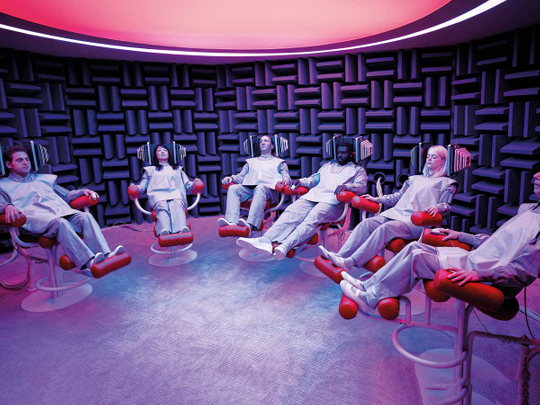
In an early episode of the Julia Roberts show ‘Homecoming’, a soldier is brought back from Afghanistan to live in a rehabilitation centre in Florida, where he will learn to reintegrate into civilian life. At dinner in the hall, he begins to question the food on the plate in front of him. The pineapple cobbler the men are served every night is “really laying it on thick”, he announces, served to make them believe they are in Florida. But how do they know where they really are? Could they leave the facility, from which they are supposedly free to go, to have a beer in a local bar? Are we watching a soldier grapple with PTSD, or are his questions about his reality actually pointing towards the series’ central mystery, tantalisingly about to unravel?
In ‘Homecoming’, Roberts stars as Heidi Bergman, a case worker at the facility. When we meet her four years later, she seems not to remember much at all about her work there. There is layer on layer of uncertainty and unreliability, a sense that the floor is shifting underneath us. That suits Sam Esmail, the creator and director of the series, just fine. He created the similarly perception-bending ‘Mr Robot’. “I never consciously made the choice when I wrote ‘Mr Robot’ or signed on to ‘Homecoming’,” he says, over the phone from Los Angeles, “but what ties those projects together is something that resonated with me about our relationship with reality, and whether we can trust it, or not.”
‘Homecoming’ is the latest in a recent wave of television shows that turn introspection outwards. In Noah Hawley’s Marvel-based series ‘Legion’, Dan Stevens plays Haller, a mutant diagnosed with schizophrenia, who navigates incarceration while dealing with several characters who live inside his imagination. (In the comics, he has dissociative personality disorder, once known as multiple personality disorder.) It’s a head trip overloaded with joyfully outrageous visuals.
In Netflix’s ‘Maniac’, directed by Cary Fukunaga, volunteers for a medical trial experience altered realities, mostly induced by the drugs they are taking. Jonah Hill’s character, Owen Milgrim, has schizophrenia, which means that, even outside the trial, he has visions of a version of his brother, guiding him on a mysterious quest. The division between what is real and what is imagined is never quite clear.
While many of these series deal with real psychiatric disorders, these are not documentaries, and they exist within a fantastical world. Esmail is aware of the responsibility that comes with portraying psychiatric disorders on screen. “There’s one side of it, which is to be respectful, but there’s another, which is to have it resonate with people,” he says. “That was really important in ‘Homecoming’ and ‘Mr Robot’. You never want to turn it into something gimmicky because I think that would feel cheap and disingenuous.”
Dr Mark Freestone is a senior lecturer in psychiatry at Queen Mary University of London. He is also a psychiatric consultant on ‘Killing Eve’, where he advises on assassin Villanelle’s psychopathy. “I think everybody has some things inside them that aren’t quite right, some odd beliefs about themselves, some strange perceptions,” he says. “Sometimes you might see things or hear things that aren’t there, and I think that’s common to just about everyone. What this spate of TV series is saying is, look, we want to put that on the screen and look at it and see if it makes sense to us, or helps us to better understand our own situation.”
Some would argue that this current vogue for alternate psychological realities began with ‘Mr Robot’, although its central character, Elliott, played by Rami Malek, has what appears to be dissociative personality disorder, which leaves the viewers adrift as to who, or what, is actually there. Esmail says that, while he has seen a lot of shows recently that bring a character’s psychological state to the fore, “I don’t know if I would credit ‘Mr Robot’ with kicking that off. When I first saw ‘The Sopranos’, just the concept of a mafia captain seeing a therapist, was groundbreaking and novel and fascinating. Maybe I would put the credit there, where we started to get into psychology in a direct way.”
As well as the psychological setting of the therapy sessions between Tony and Dr Melfi, ‘The Sopranos’ was famous for its dream sequences. Creative writing courses teach pupils to avoid the unfair rug-pull of “it was all a dream”, but ‘The Sopranos’ turned it into a masterful way to explore the characters’ motives and hidden desires, such as ‘The Test Dream’, from season five, which saw Tony riding a horse through the family living room. “You can tell that David Chase and his team really took those episodes seriously,” Esmail says, “because they had the dream episodes down right, in terms of dream logic and how we dream, and why certain imagery and symbolism reappear in dreams and what they mean. It’s one of my favourite episodes of television, and definitely my favourite ‘Sopranos’ episode, because it dealt with psychology in such a cinematic way.”
We live in an era of mass surveillance, in which our phones and our household appliances are able to listen to or even record our conversations. Then there’s our political climate: misinformation, fake news, dishonest politicians, a culture in which the idea of believing what you see or hear is an increasingly rare luxury. “It all adds up to this unprecedented increase of paranoia in society,” Esmail says. It makes sense we are drawn to characters who are forced to confront that, albeit in extreme ways. “Absolutely. I think that’s a reflection of how we feel.”













